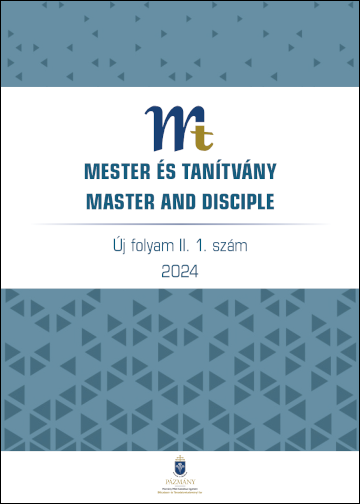Students in The Humanities, Social Sciences, and Education, Their Knowledge of Artificial Intelligence and The Everyday Use of AI
Published 11-07-2024
Keywords
- artificial intelligence,
- university students,
- humanities,
- social sciences,
- pedagogy
Copyright (c) 2024 Rajki Zoltán

This work is licensed under a Creative Commons Attribution 4.0 International License.
Abstract
This study aims to assess the knowledge of students of humanities, social sciences, and pedagogy about artificial intelligence (AI) and to investigate to what extent and in which areas they use or plan to use AI tools in their everyday lives. The questionnaire was completed by 1,027 participants, 65% of whom were full-time students and 35% of whom were part-time students. Of the students' fields of study, 34.5% were in the humanities, 43.7% in the social sciences, and 21.1% in education. On average, participants scored 78.2% on the 8-question true/false test assessing their knowledge of the typical features of AI applications. Out of the 9 domains given, participants regularly or occasionally used an AI application in an average of 1.92 domains. The study also examined students' openness to using AI tools in 4 areas (learning, work, leisure, communication and social media). On average, participants indicated 2.3 areas, and only 16.5% said that they do not use or do not plan to use an AI tool in any of these areas. The variables were analyzed using multinomial logistic regression, examining the effect of gender, grade, and field of study on the data obtained. The results indicate that a significant proportion of participants have a basic knowledge of AI and are willing or already using these tools in several areas of their daily lives.
References
- Alowais, A. et al. (2023). Revolutionizing healthcare: the role of artificial intelligence in clinical practice. BMC Med Educ, 23, 689. https://doi.org/10.1186/s12909-023-04698-z
- Amisha, Malik P., Pathania M. & Rathaur V. K. (2019). Overview of artificial intelligence in medicine. J Family Med Prim Care. 8(7). 2328−2331. https://doi.org/10.41031
- Budapesti Corvinus Egyetem (2023). A corvinusos hallgatók többsége használ mesterséges intelligenciát. https://www.uni-corvinus.hu/post/hir/a-corvinusoshallgatok-tobbsege-hasznal-mesterseges-intelligenciat/
- Copenland, B. J. (2024). artificial intelligence. Britannica. https://www.britannica.com/technology/artificial-intelligence
- Costa, M. (2023). Why are fewer women using AI than Men. BBC, https://www.bbc.com/news/business-67217915
- Demeter Zs. & Mező, K. (2023a). A mesterséges intelligencia pedagógiai használatára vonatkozó hajlandóság vizsgálata gyógypedagógus hallgatók körében. Különleges Bánásmód Interdiszciplináris folyóirat, 9. (2). 31–45. doi: 10.18458/KB.2023.2.31
- Demeter Zs. & Mező K. (2023b). Tanító szakos hallgatók és a mesterséges intelligencia. Mesterséges Intelligencia – interdiszciplináris folyóirat, V. évf. 2023/1. szám. 73–87. https://doi.org/10.35406/MI.2023.1.73
- European Commission (2021). Study on eHealth, Interoperability of Health Data and Artificial Intelligence for Health and Care in the European Union. https://digitalstrategy.ec.europa.eu/hu/library/artificial-intelligence-healthcare-report
- Europarl (2020). What is artificial intelligence and how is it used? Europarl.europa.eu https://www.europarl.europa.eu/topics/en/article/20200827STO85804/what-is-artificial-intelligence-and-how-is-it-used
- Fokas, A. (2023). Can artificial intelligence reach human thought? PNAS Nexus. https://doi.org/10.1093/pnasnexus/pgad409
- Futurepedia.io https://www.futurepedia.io/
- Hines, K. (2023). Should You Trust An AI Detector? Search Engine Journal, https://www.searchenginejournal.com/should-you-trust-an-aidetector/491949/#close
- -HL- (2023). A magyar lakosság keveset tud a mesterséges intelligenciáról. Index.hu https://index.hu/tudomany/2023/09/15/mesterseges-intelligencia-ai-technologiarichter-bosch-felmeres/
- Howington, J. (2023). The AI Gender Gap: Exploring Variances in Workplace Adoption. Flexjobs. https://www.flexjobs.com/blog/post/the-ai-gender-gap-exploring-variancesin-workplace-adoption
- Idemudia, I. & Onoshakpor, C. (2023). Gender, Workforce and Artificial Intelligence, IEEE AFRICON, Nairobi, Kenya, 1–3, https://doi.org/10.1109/AFRICON55910.2023.10293367.
- Ipsos (2022). Global Opininons And Expectations About Artificial Intelligence. A Global survey. https://www.ipsos.com/sites/default/files/ct/publication/documents/2022-01/Ipsos%20-%20Global-opinions-and-expectations-about-AI-2022.pdf
- Kneusal, R. T. (2023). How AI Works: From Sorcery to Science Paperback. No Starch Press.
- Milosavljevic, I. (2023). Netflix Recommends: Algorithms, Film Choice, and The History of Taste. Media Studies and Applied Ethics. 4(2). https://doi.org/10.46630/msae.2.2023.07
- Mishra, R. (2023). Analysis of hybrid combination of NLP and AI for any kind of applications. 2023 3rd International Conference on Advance Computing and Innovative Technologies in Engineering (ICACITE), Greater Noida, India, 2087–2090. https://doi.org/10.1109/ICACITE57410.2023.10182993
- OECD (2023). OECD Employment Outlook 2023: Artificial Intelligence and the Labour Market, OECD Publishing, Paris, https://doi.org/10.1787/08785bba-en
- OECD (én.). Artificial Intelligence & Responsible Business Conduct. https://mneguidelines.oecd.org/RBC-and-artificial-intelligence.pdf
- Ofosu-Ampong, K. (2023). Gender Differences in Perception of Artificial Intelligence-Based Tools. JDAH 4(2), 52−56., (2023). https://doi.org/10.33847/2712-8149.4.2_6
- Russel, S. & Norvig, P. (1995). Artificial Intelligence: A Modern Approach. Prentice Hall Series in Artificial Intelligence.
- Turing, A. M. (1950). Computing Machinery And Intelligence. Mind. 59(10), 433–460.
- Udvaros, J. & Forman N. (2023). Artificial Intelligence And Education 4.0. Inted2023 Proceedings, 6309–6317. https://doi.org/10.21125/inted.2023.1670
- VG (2023). Minden harmadik fiatal aggódik amiatt, hogy a mesterséges intelligencia elveszi a munkáját. Világgazdaság, https://www.vg.hu/cegvilag/2023/06/mindenharmadik-fiatal-aggodik-amiatt-hogy-a-mesterseges-intelligencia-elveszi-amunkajat
- Webradio (2023). EY-felmérés: a mesterséges intelligencia társadalmi, etikai, biztonsági kockázataitól tartanak leginkább a döntéshozók. Webradio.hu https://webradio.hu/hirek/gazdasag/ey-felmeres-a-mesterseges-intelligencia-tarsadalmietikai-biztonsagi-kockazataitol-tartanak-leginkabb-a-donteshozok
- Zha, D., Bhat, Z., Lai, K., Yang, F., Jiang, Z., Zhong, S. & Hu, X. (2023). Data-centric Artificial Intelligence: A Survey. ArXiv, abs/2303.10158. https://doi.org/10.48550/arXiv.2303.10158

